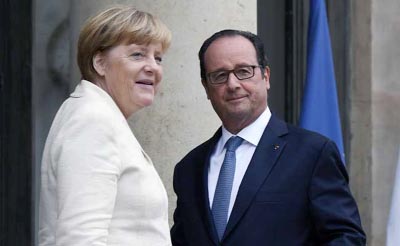
AFP, Paris :
German Chancellor Angela Merkel called Thursday on EU leaders meeting this week without Britain to come up with a “realistic” plan for Europe that reflects the bloc’s “concerns, hopes and desires.”
Speaking ahead of a meeting with French President Francois Hollande in Paris, Merkel said security and prosperity should take centre stage at Friday’s summit in the Slovakian capital Bratislava. Merkel said the current wave of jihadist violence and the mass influx of migrants demanded a common European approach.
“We must protect our external borders and we must provide a common response,” she stressed, adding that Europe needed to address citizens’ concerns in order to remain “a continent of hope”.
Hollande said the summit aimed to agree a “roadmap” for Europe’s post-Brexit future, including improved defence capabilities, greater investment in renewable energy and a new push on training and jobs for the continent’s legions of jobless youth.
The Bratislava summit is intended to give the EU a new sense of purpose after the existential crisis triggered by Britain’s shock referendum decision to quit the bloc.
Meanwhile, European Union leaders gathered in a centuries-old castle in the middle of their fractious continent Friday, hoping to find a sense of common purpose again in the face of the planned departure of Britain and fundamental disagreements over everything from uncontrolled migration to the economy.
The 27 leaders, minus British Prime Minister Theresa May, hope their daylong talks in the Slovak capital will provide the broad outlines of a new “Bratislava roadmap” that should lead to a new-look EU by next spring following the shock British referendum result in June.
Slovak Prime Minister and summit co-host Robert Fico said that “we all want to show unity and we all want to show that this is a unique project and we need to continue.”
France and Germany have been the driving nations behind the EU since its inception over half a century ago and they are cooperating intensely to get the EU back on the rails ahead of a summit in the Italian capital next March, which will mark the 60th anniversary of the EU’s founding Treaty of Rome.
With divisions rife among the 27 nations even now that Britain is on the way out, German Chancellor Angela Merkel acknowledged the task ahead was massive. “We are in a critical situation,” she said.
German Chancellor Angela Merkel called Thursday on EU leaders meeting this week without Britain to come up with a “realistic” plan for Europe that reflects the bloc’s “concerns, hopes and desires.”
Speaking ahead of a meeting with French President Francois Hollande in Paris, Merkel said security and prosperity should take centre stage at Friday’s summit in the Slovakian capital Bratislava. Merkel said the current wave of jihadist violence and the mass influx of migrants demanded a common European approach.
“We must protect our external borders and we must provide a common response,” she stressed, adding that Europe needed to address citizens’ concerns in order to remain “a continent of hope”.
Hollande said the summit aimed to agree a “roadmap” for Europe’s post-Brexit future, including improved defence capabilities, greater investment in renewable energy and a new push on training and jobs for the continent’s legions of jobless youth.
The Bratislava summit is intended to give the EU a new sense of purpose after the existential crisis triggered by Britain’s shock referendum decision to quit the bloc.
Meanwhile, European Union leaders gathered in a centuries-old castle in the middle of their fractious continent Friday, hoping to find a sense of common purpose again in the face of the planned departure of Britain and fundamental disagreements over everything from uncontrolled migration to the economy.
The 27 leaders, minus British Prime Minister Theresa May, hope their daylong talks in the Slovak capital will provide the broad outlines of a new “Bratislava roadmap” that should lead to a new-look EU by next spring following the shock British referendum result in June.
Slovak Prime Minister and summit co-host Robert Fico said that “we all want to show unity and we all want to show that this is a unique project and we need to continue.”
France and Germany have been the driving nations behind the EU since its inception over half a century ago and they are cooperating intensely to get the EU back on the rails ahead of a summit in the Italian capital next March, which will mark the 60th anniversary of the EU’s founding Treaty of Rome.
With divisions rife among the 27 nations even now that Britain is on the way out, German Chancellor Angela Merkel acknowledged the task ahead was massive. “We are in a critical situation,” she said.

